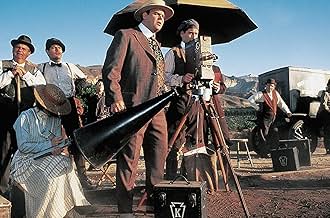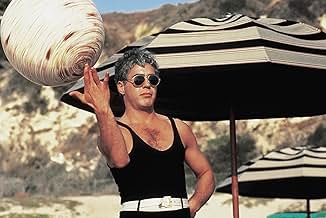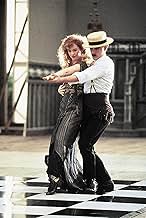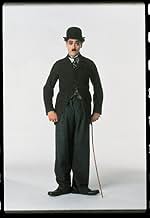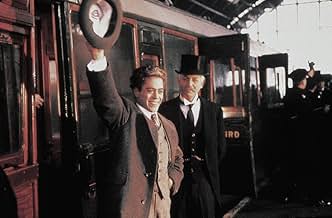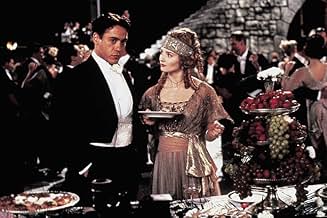Ein Film über das schwierige und umstrittene Leben des Meisterkomödianten Charlie Chaplin.Ein Film über das schwierige und umstrittene Leben des Meisterkomödianten Charlie Chaplin.Ein Film über das schwierige und umstrittene Leben des Meisterkomödianten Charlie Chaplin.
- Für 3 Oscars nominiert
- 3 Gewinne & 20 Nominierungen insgesamt
Deborah Moore
- Lita Grey
- (as Deborah Maria Moore)
Empfohlene Bewertungen
This film is beautiful and intelligent, if a little ambitious and overlong (2 and a quarter hours). But it is so worth seeing, for the superb Oscar-nominated performance from Robert Downey Junior. The film starts off flawlessly, with beautiful incidental music from John Barry, and a fantastic performance from Geraldine Chaplin, who played her own grandmother.
We also see Fred Karno, robustly played by John Thaw, and Hetty , played by Moira Kelly(who did struggle with the accent). A standout from the supporting cast, was a lively performance from Kevin Kline, who brought some great energy into the role of Douglas Fairbanks. The performances in general are very good indeed, and the film looks ravishing with show stopping costumes and scenery.
However, it is after the death of Fairbanks, that the film starts to drag, and the title characters rapidly turn into a series of vignettes. As much a great actor Anthony Hopkins is, his turn as the fictional autobiographer was perhaps unnecessary. And I was a bit confused why they turned Hoover as a villain who wanted Chaplin out of the country. The ending is poignant, and Moira Kelly does better in her role as Oona.
The end credits were very educational, and the arrangement of Smile was one of my highlights of this beautifully made but ambitious film. Worth watching for those who are a fan of Richard Attenborough (the director) 8/10 Bethany cox
We also see Fred Karno, robustly played by John Thaw, and Hetty , played by Moira Kelly(who did struggle with the accent). A standout from the supporting cast, was a lively performance from Kevin Kline, who brought some great energy into the role of Douglas Fairbanks. The performances in general are very good indeed, and the film looks ravishing with show stopping costumes and scenery.
However, it is after the death of Fairbanks, that the film starts to drag, and the title characters rapidly turn into a series of vignettes. As much a great actor Anthony Hopkins is, his turn as the fictional autobiographer was perhaps unnecessary. And I was a bit confused why they turned Hoover as a villain who wanted Chaplin out of the country. The ending is poignant, and Moira Kelly does better in her role as Oona.
The end credits were very educational, and the arrangement of Smile was one of my highlights of this beautifully made but ambitious film. Worth watching for those who are a fan of Richard Attenborough (the director) 8/10 Bethany cox
Robert Downey Jr., first of all, portrays Chaplin with amazing accuracy. Some parts of this performance are particularly memorable, such as his invention of the famous tramp's walk just after having feverishly picked out the outfit, the astonishingly accurate depiction of Charlie as an old man, and of course, the many parts of the film that involve parts of his life where he was working on his own films. These are clearly some of the most interesting parts of the movie, if only because these films are how we know him, but it is at least as interesting the way that the film hints towards things that happened in Chaplin's life that inspired those films.
Very early in the film, we see a scene in which Charlie's mother is booed off the stage by an impatient crowd, so Charlie, who is a little boy at the time, gets on stage to do a song and dance of his own. He performs a song that is very similar to the one his mother performed, but he wins the audience's heart and they respond by tossing coins onto the stage for him. You can't help noticing how this corresponds with the constantly youthful look of the Tramp (in Modern Times, for example, Chaplin was in his late 40s but looked like a teenager), and the coins tossed on stage may have played a significant role in helping him realize that this could be a good way to make money.
Charlie moves to America to pursue his dream, and we see the landmark events that punctuated his dizzying rise to stardom. He goes to work briefly on stage and is then hired by Mack Sennett, a gigantic figure in film history, but is unsatisfied because of his own lack of control over his work. It should also be noted here that there is a scene where he is working with director Mabel Normand, who demands acting from him that he does not agree with, and with whom he clashes. In 1914, Chaplin starred in a 9 ½ minute film called Mabel's Busy Day, in which he plays the uncharacteristic role of the antagonist. The Mabel in this film is a sporting event vendor who turns down Charlie's amorous advances, after which Charlie proceeds to steal all of her products and hand them out to anyone standing nearby. Then in 1920, he starred in another short comedy called Mabel's Strange Predicament, in which Mabel is a woman who becomes locked out of her hotel room in her pajamas and ends up avoiding the drunken Charlie for the rest of the film. In both films, Charlie plays uncharacteristic roles, the most unenviable of which was in Mabel's Busy Day, which Mabel Norman directed.
Later in the film we see Charlie in a small diner just after having terminated his employment with Mack Sennett, and he meets Edna Purviance in a scene that is reminiscent of his romantic endeavors in such early films as Caught In A Cabaret and, even more so, The Immigrant, one of his most famous early films. There are dozens of other references to the development of his cinematic personality - such as his sudden realization of how to make the Tramp appear rich to the blind girl in City Lights without talking, as well as the dance of the dinner rolls, which Charlie performs here at a dinner at an expensive restaurant - but there is an even more significant portrayal of Charlie's beliefs and his values in this movie that are more recognizable as well as more memorable to people not familiar with his earlier and less known work.
Charlie Chaplin was one of many filmmakers' in the earlier times of the medium that resented and disapproved of the coming of sound to the movies. His Tramp remains one of the most recognized figures in the history of the cinema, and it is widely known that the Tramp is an almost entirely silent character, so it is necessary for a film about Chaplin's life to address this in some way, and it is done perfectly here. There is a scene where Charlie's brother is trying to convince him to add spoken dialogue into his films and Charlie refuses outright, giving a hilarious example of a Russian ballet dancer and saying, `The Tramp CAN'T talk. The minute he talks, he's dead.' This is a brilliant way to illustrate Charlie's fondness for the silent film, as well as his knowledge that no voice given to the Tramp would fit his character right. He was too well known to be changed so profoundly.
Charlie Chaplin created 81 movies in his lifetime, many of them timeless and truly memorable, and has made a significant impact on the filmmaking medium as well as on the world itself. He was a fascinating personality both onscreen and off, which is another element of his life that was necessarily and skillfully presented in this film, this time directly in the dialogue in what is probably the single most important line in the entire film `If you want to understand me, watch my movies.' Chaplin's ever-present sympathy for the underprivileged is subtly but effectively portrayed as two poor people approach him on his way out of a nice restaurant, right at the beginning of the Great Depression, asking for his autograph. The elderly Charlie notes in retrospect that, `I wish they'd wanted my money.'
He is always aware throughout the film and throughout his life of the difficulties constantly facing poor people, and he wants to give these people not only an escape with his films, but hope for the future. There is a point in the film where Charlie has returned to Europe to see an old friend, and he learns on the train that she has died. He is then asked, `What'll we do, Charlie?' And his answer, although spoken under his breath almost in a whisper, rings louder than anything else in the film.
`Smile.'
Very early in the film, we see a scene in which Charlie's mother is booed off the stage by an impatient crowd, so Charlie, who is a little boy at the time, gets on stage to do a song and dance of his own. He performs a song that is very similar to the one his mother performed, but he wins the audience's heart and they respond by tossing coins onto the stage for him. You can't help noticing how this corresponds with the constantly youthful look of the Tramp (in Modern Times, for example, Chaplin was in his late 40s but looked like a teenager), and the coins tossed on stage may have played a significant role in helping him realize that this could be a good way to make money.
Charlie moves to America to pursue his dream, and we see the landmark events that punctuated his dizzying rise to stardom. He goes to work briefly on stage and is then hired by Mack Sennett, a gigantic figure in film history, but is unsatisfied because of his own lack of control over his work. It should also be noted here that there is a scene where he is working with director Mabel Normand, who demands acting from him that he does not agree with, and with whom he clashes. In 1914, Chaplin starred in a 9 ½ minute film called Mabel's Busy Day, in which he plays the uncharacteristic role of the antagonist. The Mabel in this film is a sporting event vendor who turns down Charlie's amorous advances, after which Charlie proceeds to steal all of her products and hand them out to anyone standing nearby. Then in 1920, he starred in another short comedy called Mabel's Strange Predicament, in which Mabel is a woman who becomes locked out of her hotel room in her pajamas and ends up avoiding the drunken Charlie for the rest of the film. In both films, Charlie plays uncharacteristic roles, the most unenviable of which was in Mabel's Busy Day, which Mabel Norman directed.
Later in the film we see Charlie in a small diner just after having terminated his employment with Mack Sennett, and he meets Edna Purviance in a scene that is reminiscent of his romantic endeavors in such early films as Caught In A Cabaret and, even more so, The Immigrant, one of his most famous early films. There are dozens of other references to the development of his cinematic personality - such as his sudden realization of how to make the Tramp appear rich to the blind girl in City Lights without talking, as well as the dance of the dinner rolls, which Charlie performs here at a dinner at an expensive restaurant - but there is an even more significant portrayal of Charlie's beliefs and his values in this movie that are more recognizable as well as more memorable to people not familiar with his earlier and less known work.
Charlie Chaplin was one of many filmmakers' in the earlier times of the medium that resented and disapproved of the coming of sound to the movies. His Tramp remains one of the most recognized figures in the history of the cinema, and it is widely known that the Tramp is an almost entirely silent character, so it is necessary for a film about Chaplin's life to address this in some way, and it is done perfectly here. There is a scene where Charlie's brother is trying to convince him to add spoken dialogue into his films and Charlie refuses outright, giving a hilarious example of a Russian ballet dancer and saying, `The Tramp CAN'T talk. The minute he talks, he's dead.' This is a brilliant way to illustrate Charlie's fondness for the silent film, as well as his knowledge that no voice given to the Tramp would fit his character right. He was too well known to be changed so profoundly.
Charlie Chaplin created 81 movies in his lifetime, many of them timeless and truly memorable, and has made a significant impact on the filmmaking medium as well as on the world itself. He was a fascinating personality both onscreen and off, which is another element of his life that was necessarily and skillfully presented in this film, this time directly in the dialogue in what is probably the single most important line in the entire film `If you want to understand me, watch my movies.' Chaplin's ever-present sympathy for the underprivileged is subtly but effectively portrayed as two poor people approach him on his way out of a nice restaurant, right at the beginning of the Great Depression, asking for his autograph. The elderly Charlie notes in retrospect that, `I wish they'd wanted my money.'
He is always aware throughout the film and throughout his life of the difficulties constantly facing poor people, and he wants to give these people not only an escape with his films, but hope for the future. There is a point in the film where Charlie has returned to Europe to see an old friend, and he learns on the train that she has died. He is then asked, `What'll we do, Charlie?' And his answer, although spoken under his breath almost in a whisper, rings louder than anything else in the film.
`Smile.'
Thankyou to Richard Attenborough for this film. I watched it many a time and enjoyed both the biographical aspect and the comedic one but it has also increased my interest in silent comics of this great era.
The film begins by exploring the early life of Charlie, his Brother Sid and his Mother as they try to scrape a living. Thankfully Attenborough doesn't concentrate too much on this deprived part of Chaplin's life. However it does reveal interesting facts about Charlie that he never forgot during his rise to superstardom.
Although Chaplin is played by younger actors at the begining it is the arrival of Robert Downey Jnr which Chaplin fans will anticipate the most. He puts in an amazing performance, his London accent is excellent and ability to do slapstick even better he also really makes you believe that the great man is alive and on the screen again.
The film rightly concentrates on the private life of Chaplin and the development of the cinema. Whilst others may want to see the film concentrate on Chaplin's great pictures e.g The Kid, Gold Rush, and the Great dictator Attenborough blends the creation of these films into specific turning points in Charlie's life. For example Modern times is used to show Chaplin's sympathy towards victims of the wall street crash, as he knew what it was like to be extremely poor. His Jewish connections are also highlighted by the Great dictator, which shows his sensitivities to the European Jews were more at heart than just a making a heap of cash by having a laugh at Hitler's moustache and goose stepping troops.
The film doesn't get bogged down by Chaplin's hectic love life, as Dickie explores Charlie's political beliefs and how J Edgar Hoover was convinced of he was a communist party member. By doing so it shows how Hoover was one of the most twisted individuals to hold public office, with a dangerous obsession on peoples private lives and background.
The film does a good job in showing how important silent stars were and how we should not forget that they were the true greats when films were developing all the time from shorts to feature length, from silent to sound.
The film begins by exploring the early life of Charlie, his Brother Sid and his Mother as they try to scrape a living. Thankfully Attenborough doesn't concentrate too much on this deprived part of Chaplin's life. However it does reveal interesting facts about Charlie that he never forgot during his rise to superstardom.
Although Chaplin is played by younger actors at the begining it is the arrival of Robert Downey Jnr which Chaplin fans will anticipate the most. He puts in an amazing performance, his London accent is excellent and ability to do slapstick even better he also really makes you believe that the great man is alive and on the screen again.
The film rightly concentrates on the private life of Chaplin and the development of the cinema. Whilst others may want to see the film concentrate on Chaplin's great pictures e.g The Kid, Gold Rush, and the Great dictator Attenborough blends the creation of these films into specific turning points in Charlie's life. For example Modern times is used to show Chaplin's sympathy towards victims of the wall street crash, as he knew what it was like to be extremely poor. His Jewish connections are also highlighted by the Great dictator, which shows his sensitivities to the European Jews were more at heart than just a making a heap of cash by having a laugh at Hitler's moustache and goose stepping troops.
The film doesn't get bogged down by Chaplin's hectic love life, as Dickie explores Charlie's political beliefs and how J Edgar Hoover was convinced of he was a communist party member. By doing so it shows how Hoover was one of the most twisted individuals to hold public office, with a dangerous obsession on peoples private lives and background.
The film does a good job in showing how important silent stars were and how we should not forget that they were the true greats when films were developing all the time from shorts to feature length, from silent to sound.
Chaplin works on many levels, because on the one hand it packs an entertaining epic in to two hours and thirty minutes, but doesn't fail to keep up your interest and comes over as being very enjoyable. Perhaps the problem is that, Chaplins life might not be the most suitable for a MOVIE,purely because his life was so eventful, and might have translated itself better as a TV Mini Series, but for getting the best out of what screen time available and still coming up with some very credible work, you must hand it over to Richard Attenborough and everyone at Carolco. For starters, the movie is simply beautiful to look at. The production design by Stuart Craig [these days of Harry Potter fame] is well tuned with the simply fantastic Cinematography by Sven Nykvist, and this is why the movie works so well, because at the more tedious intermissions the movie has to offer [and there are only a few], the movie is still interesting and prestine to watch. Just as good are Ellen Mirojnick and John Mollo's costumes designs, in fact, Chaplin offers a production so rich that at once i forgot that this was a period film, and felt transported back to the various different time zones the movie had to offer, and this is a good sign of a genius at work. Richard Attenborough did similar wonders with his Ghandi [1982], in my opinion he does it far more interestingly here. The real revelation of the movie is Robert Downey JR as Chaplin. I remember reading in a book entitled The Chaplin Encyclopedia, that hearts sank when an American assumed the role. Well, i cant really understand the kinetics behind this seeing that Chaplin spent 85% of his life away from England and was more of a worldwide Icon than a British spearhead, plus the fact that Americans ARE Good Actors, and Downey JR is one of the very finest. Charlie Chaplin himself was a couple of years before my time, but Downey JR is so fantastic, so realistic in the role that i didn't for one minute doubt the genius of the REAL Chaplin and in fact only became a fan of the little tramp after seeing this Biopic, as though the missing pieces of Chaplins life had come together to complete the jigsaw. Downey JR carries the movie, it is hard to imagine anyone else in the role, he is the right build, height and of simmilar looks and even nails the accent down. He even does The Little Tramp so covincingly that i think that Chaplin himself would have been forced to admit how good he is. This could prove to be Downey JR's best work on screen, but i hope like many other of his admirers that things do go right for him,and he gets on the right track and he is good to himself in future. On a side note i definitely think that Robert was worthy of the Academy Award for best actor for this, but the BAFTA is more than Justified. Hopefully his role in the adaption of Denis Potter's The Singing Detective will be good enough for him to be recognised by the Academy. The only down side to the characterisation awarded to Robert Downey JR in the title role is that the other characters pale in significance. Admitedly it is nice to see the famous faces such as Kevin Kline as Douglas Fairbanks, Diane Lane, Penelope Anne Miller and the Late great John Thaw in a heart rendering cameo as Chaplins great influence Fred Karno. But their characters are so limited that the come a cross as essential but perhaps slightly surplus. More impressive and important are the likes of Dan Ackroyd in an hillarious cameo as Mack Sennet, and the interstingly cast Geraldine Chaplin as her own grandmother Hanna. The fact that Hannah Caplin was mentally ill and the effects it had on Charlie Chaplin are nicely hinted at but in large glossed over. Anthony Hopkins is, it must be said, wasted as the fictional George Hayden. It is however reassuring to see Hopkins, and he himself 15 or so years earlier might have made a good Chaplin himself. Paul Rhys, too is kept in the dark, wich is unfortunate because the character he plays, Chaplins brother sid, was quite a big cog in the Chaplin works [see Modern Times-joke]. The nicest other part is that of Hetty Kelly/Oona Chaplin, Chaplins first and last loves, played by Moira Kelly. Kelly's presence adds a nice touch of grace and gentleness to the movie. Perhaps the real failing of the movie is, like this review, it tries to pack to much in, and like i said this would have been better done as a TV Mini series, or even two movies. These minor quibbles asides, Chaplin boasts an enjoyably epic screenplay by Diana Hawkins, William Boyd, Bryan Forbes and the Legendary William Goldman, based on David Robinsons Chaplin-His Life and Art and My Autobiography by Chaplin Himself. The movie is tightly directed and edited, includes nice trick photography and is very professionaly and well acted, particularly y Robert Downey JR but everyone ivolved does well, no matter the merits of the characterisations. It also has one of the most beautiful, moving musical scores by John Barry, perhaps his best, sadly over looked of scores. If you havent seen the movie, i hope this review helps whet your appetite, because it is a very worthwhile worth seeing movie..........
Robert Downey, Jr. gives another one of his splendid performances, Kevin Kline is perfectly cast as Fairbanks, and most of the direction is superb. However, the story hops around a few too many times, and the scenes with Anthony Hopkins are weak and obviously placed in order to clarify things to non- Chaplin fans who watch the film. Overall it is enjoyable, especially the parts when we see him creating his well- known masterpieces. Recommended especially for movie fans, and most especially for Chaplin fans.
Wusstest du schon
- WissenswertesGeraldine Chaplin played her real-life paternal grandmother Hannah Chaplin.
- PatzerWhen Charlie is shown at the 1972 Oscars near the end of the movie, he is showed being brought to the podium in the wheelchair and then standing at the podium as the movie clips played. In the actual awards ceremony, Charlie walked out to the podium under his own power after the clips ended.
- Zitate
German Diplomat: [offering his hand] Mr. Chaplin! I am a great admirer of yours.
Charlie Chaplin: I'm sorry, I prefer not to shake hands with Nazis.
German Diplomat: [laughs nervously] What have you got against us, Mr. Chaplin, hm?
Charlie Chaplin: What have you got against everybody else?
- Crazy CreditsThe film ends with the final scene of Der Zirkus (1928): Charlie Chaplin walks off into the distance.
- Alternative VersionenTo receive a 12 certificate the original UK cinema version was cut to remove one use of 'fucking' (during Charlie's homecoming visit to a pub). Later releases were uncut and upgraded to a 15 rating.
- VerbindungenFeatured in Friday Night: Folge #1.11 (1992)
- SoundtracksThe Honeysuckle and The Bee
Written by Albert Fitz and William H. Penn (as William Penn)
Top-Auswahl
Melde dich zum Bewerten an und greife auf die Watchlist für personalisierte Empfehlungen zu.
- How long is Chaplin?Powered by Alexa
Details
- Erscheinungsdatum
- Herkunftsländer
- Offizielle Standorte
- Sprachen
- Auch bekannt als
- Chaplin
- Drehorte
- Produktionsfirmen
- Weitere beteiligte Unternehmen bei IMDbPro anzeigen
Box Office
- Budget
- 31.000.000 $ (geschätzt)
- Bruttoertrag in den USA und Kanada
- 9.493.259 $
- Eröffnungswochenende in den USA und in Kanada
- 84.669 $
- 27. Dez. 1992
- Weltweiter Bruttoertrag
- 9.493.259 $
- Laufzeit2 Stunden 23 Minuten
- Farbe
- Seitenverhältnis
- 1.85 : 1
Zu dieser Seite beitragen
Bearbeitung vorschlagen oder fehlenden Inhalt hinzufügen

Oberste Lücke
What is the Hindi language plot outline for Chaplin - Das Leben der unsterblichen Filmlegende (1992)?
Antwort


